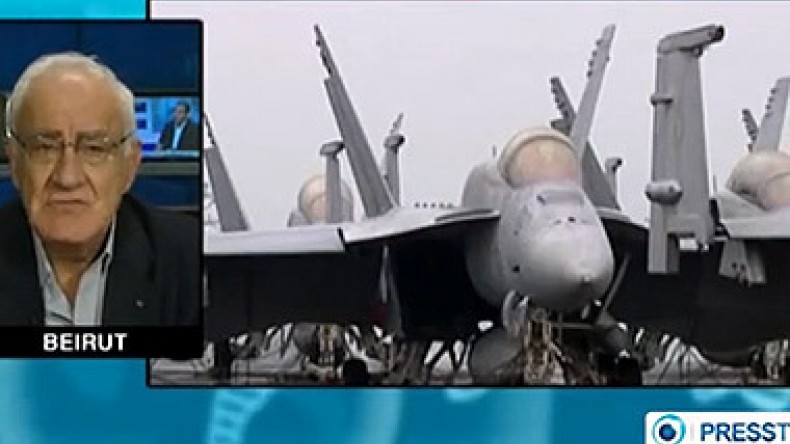
US strike on Syria may lead to regional war - Hisham Jaber
Press TV has conducted an interview with Hisham Jaber, a retired army general, about the consequences of potential US strikes against Syria.
- First of all, I’d like to get your thoughts on the notion of the United States, which is intending to increase its fire power capacity against Syria. Are they going for a large-scale military action there, far broader than what they have expressed so far?
- I think President Obama put himself before two difficult choices when he was threatening Syria to strike it. … he found that the majority of the American people are against it and also the whole world is divided; and no evidence; and also the United Nations; and specially he did not want to take such adventure and he knows that it may lead to a regional war and maybe wider. So he sent the file to the Congress.
Now [Obama being] in a meeting in Saint Petersburg, personally, I do not believe that Mr. Obama can give any commitment even if he is under the pressure of Mr. Putin and half of the G20 members who are against the war, because he would say, ‘Sorry, I sent the file to the Congress and I have to wait,’ and he hopes that the Congress - in my opinion - would say no.
The Congress itself has been changed, you know; opinions since four days so far; because now we hear that the percentage or the possibility that the Congress would say no, which was very small became higher.
We do expect, we still have hope that 40 percent of the Congress would say no. If the Congress will have a meeting after the weekend - and you have to accept the decision of the Congress - if the Congress would say yes to Obama, go ahead, Obama cannot stop that plan and for that he will make the first strike and we learned that he did inform Mr. Putin about the first strike which consists of very quick and narrow and limited strike and he will hit about 30 to 40 targets only.
All depends, in my opinion, on the Syrian reaction. If the Syrian military reaction is hard, for example, and kills American personnel on the sea, I do not think Mr. Obama will quit. He will start the second strike, which will be stronger and wider. And it may lead, as we said, you know, to escalation, to a risk of a regional war.
- Mr. Jaber, what I’d like to go next is the issue of Syrian retaliation. What kind of capacity does Syria have in retaliation and if Syria’s sovereignty is breached with this unilateral US-led attack, what should the US be expecting in return?
- Yes, first of all, Syria has a very sophisticated air defense system. Everybody knows this and the Americans did recognize this.
Syria has 60,000 personnel soldiers in the air defense system. Syria has S-200…, which are against missiles and air defense. Also if their attack will come from the air, [an] air strike, of course Syria will use all this air defense system, which is sophisticated as we said. And that was the reason that America did not create a no-fly zone.
Second, if the attack will come from the sea, Syria of course will use Tomahawk cruise [as] I said and will use S-200 maybe to intercept but it will not be very effective.
But, we do believe that Syria still has 72 or less missiles Yakhont delivered by Moscow a few months ago. Those missiles are land-to-sea. If Syria will react and will make reaction, will launch those missiles against American warship, it may hit and kill American soldiers and personnel and Navy men on the sea.
This is almost sure. Even the Americans do have missiles to intercept Yakhont, but it is not secure one hundred percent. If this will happen I think America or Obama will retaliate - as we said - stronger and we will have escalation.
Second, Syria has thousands of missiles like Frog and Scud. It may launch it against [them] in the air.
Newsfeed
Videos






























